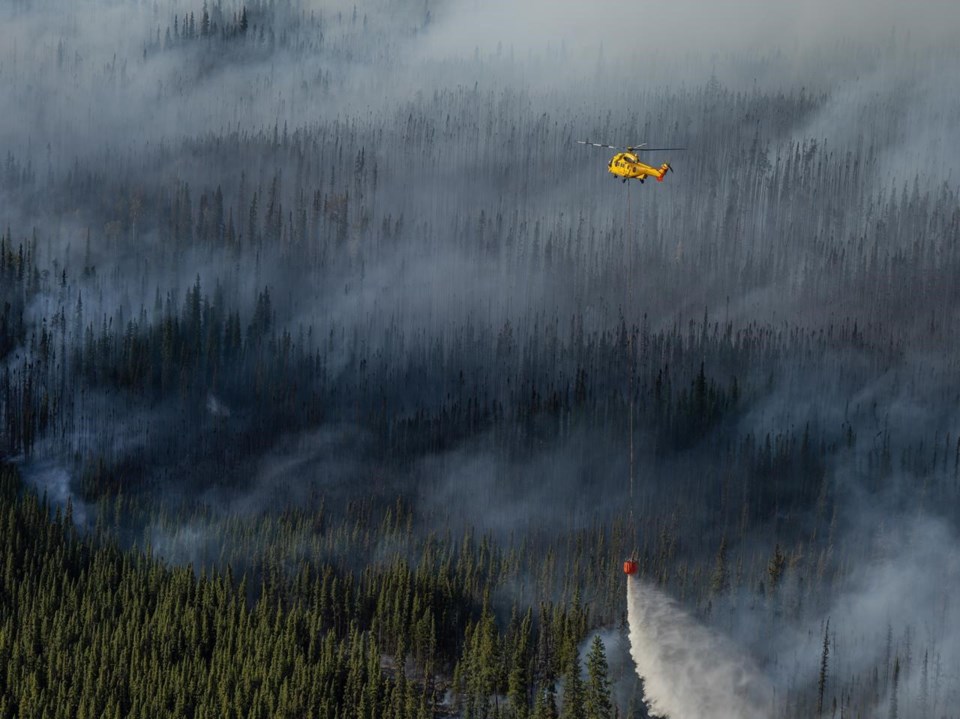VICTORIA — Critical strategy shifts are urgently needed to cut the risk of catastrophic wildfires in British Columbia forests that threaten to decimate ecosystems and communities, says an independent forests watchdog report.
The B.C. Forests Practices Board is calling on the provincial government to undertake a "paradigm shift" in how it manages forests, saying wildfire risk mitigation currently focuses on areas near communities, but leaves the wider forest landscape "severely vulnerable."
The report comes as the largest wildfire in the province's history, the Donnie Creek wildfire, continues to burn out of control in the remote northeast.
"The key is there's an urgency to this," board chair Keith Atkinson said in an interview. "We're obviously experiencing, maybe, our most severe year in front of us."
The Donnie Creek fire, about 150 kilometres southeast of Fort Nelson, is an example of a catastrophic wildfire that impacts few people but will cause lasting damage, he said.
"It's not in an open area that's affecting people directly but it's such a big fire that it's going to affect the resource base, the habitat, the ecosystem in a pretty damaging way as it gets to that intense level," Atkinson said.
The BC Wildfire Service says the Donnie Creek wildfire has scorched more than 5,700 square kilometres of forest since it was sparked by lightning on May 12, and it may burn until winter.
It is among more than 80 wildfires burning in the province. More than 9,600 square kilometres of land have been burned since April 1, putting the province on track for a record season.
"These really large fires that we're experiencing in recent years get to this catastrophic level where they're doing severe damage to the ground," Atkinson said. "They are really changing the nature of the soil in places, and of course they are impacting communities and infrastructure."
The report says in 2017, 2018, and 2021, B.C. experienced its three largest wildfire seasons in 102 years on record, affecting 34,000 square kilometres of land.
It recommends B.C. develop a long-term fire management vision and action plan spanning all levels of government to support landscape resilience in forests.
"Bold and immediate action is required by the provincial government to align its actions and policies with a vision of landscape resilience and human coexistence with fire," says the report.
"Unless B.C. is prepared to accept a future of increasingly frequent catastrophic wildfires and the associated costs and consequences, it is time for a paradigm shift in land management."
Government data show 45 per cent of B.C.'s public land, estimated at 390,000 square kilometres, is at high to extreme fire risk.
The report says B.C. spent about $800 million on fire suppression in 2021, but the indirect costs associated with the wildfire season could have been up to $24 billion.
Atkinson said B.C. is doing work needed to fight wildfires and protect communities, but the government must consider measures that build forest strength and lessen the risk of the large wildfires.
"What we're calling for is to sit down and think about the broader landscape level that's still out there in the forest and think about how to restore resilience from the really large fires building up," he said.
A shift to landscape fire management would create more resilient forest areas that are less vulnerable to catastrophic wildfires, said Atkinson, adding that there was a need for increased collaboration with Indigenous peoples on fire and forest management.
Landscape fire management through practices that include the creation of fuel breaks, an increase in the diversity, density and age of trees, and more use of cultural and prescribed burns in forest areas can protect the landscape from wildfire, he said.
"It's returning the forest to its own innate resilience," Atkinson said. "The fire will burn through but the stand will still continue and continue to grow."
Forests Minister Bruce Ralston said in a statement the report was a call to action to prevent wildfires.
"I appreciate this work from the Forest Practices Board, and in recent years we have taken actions that align with their recommendations, including doubling prevention programs, expanding prescribed and cultural burning, and launching new Forest Landscape Plans," he said.
"The Forest Practices Board report reinforces that we need to keep working with our partners and taking critical steps to strengthen and expand wildfire planning, preparedness and response."
He pointed to recent government budget investments to strengthen B.C.'s wildfire preparedness and response, including introducing a year-round B.C. Wildfire Service and expanding the FireSmart program to help homeowners and communities increase wildfire resiliency.
The independent Forest Practices Board reports its findings and recommendations directly to the public and government.
It audits forest and range practices on public lands and the appropriateness of government enforcement, and can make recommendations for improvement to practices and legislation.
This report by The Canadian Press was first published June 30, 2023.
Dirk Meissner, The Canadian Press



